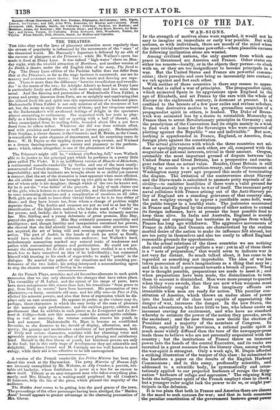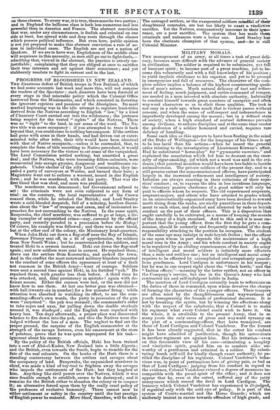TOPICS OF THE DAY.
WAR-SIGNS.
Iir the strength of motives alone were regarded, it would not be easy to imagine an immediate or early war possible. But with nations, as with individuals, there are moods of the mind when the most trivial motives become powerful—when plausible excuses for following inclination alone are wanted.
Among civilized nations, the only quarters from which our peace is threatened are America and France. Other states are either too remote—locally, or in the objects they pursue—to clash with us, or they are too insignificant to become principals in a war. But the United States and France are powerful commu- nities ; their pursuits and ours bring us incessantly into contact ; we rub against and fret each other. With neither of those countries is there any reason to appre- hend what is called a war of principles. The propagandist spirit, which animated Spain in its aggressions upon England in the age of Elizabeth, and set France by the ears with the whole of Europe in the eighteenth century, is dormant at present. It is confined to the breasts of a few poor exiles and recluse scholars. Even that derivative motive to war, groundless suspicion of a propagandist spirit in others, is hushed. The Duke of Bruns- wick was animated less by a desire to reestablish Monarchy in France than to arrest Revolutionary principles in Germany ; and the proselytism of the Convention had its origin mainly in a wish to find work at home for the Sovereigns who were suspected of plotting against the Republic "one and indivisible." But now, nothing is apprehended in France, England, or America, from foreign plots against the constitution.
The actual grievances with which the three countries not sel- dom or sparingly reproach each other, are all, compared with the magnitude of national interests, trivial in their amount. Oregon, ostensibly, the most important ground of dispute between 'the United States and Great Britain, has a prospective and contin- gent rather than an actual value. Besides, Great Britain is still willing to accede to a partition-treaty, and the Government at Washington many years ago proposed this mode of terminating the dispute. The irritation of the controversies about Slavery and the Slave-trade is calculated to promote petty reprisals of in- civility—to embitter hostilities if there were a valid ground for war—but scarcely to provoke to war of itself. The incessant petty naval collisions with France arising out of the Anti-Slavery po- licy of England are a standing grievance of that country -also, but not weighty enough to appear a justifiable emus belli, were the public temper in a healthy state. The jealousies occasioned in France and England by the attempts of either nation to extend its foreign influence, have at present the least possible food to keep them alive. In India and Australia, England is merely rounding and organizing her territories in regions from which France has long ago withdrawn. The aggressive movements of France in Africa and Oceania are characterized by the restless morbid desire of the nation to make its influence felt abroad, but are too petty in themselves and also too costly to afford England reasonable grounds for apprehension. In the actual relations of the three countries we see nothing that could either justify or palliate a war : yet in all of them there is a "note of preparation," that would seem to indicate war is not very far distant. So much talked about, it has come to be regarded as something not improbable. The idea of war has taken possession of men's imaginations as a thing that may be ; and this is in itself a movement towards a breach of peace. When war is thought possible, preparations are made to meet it ; and when preparations have been made, the disinclination to turn them to account is diminished. Men were more prompt to quarrel when they wore swords, than they are now when weapons must be deliberately sought for. Even imaginary affronts are irresistible when men are ready for action. The peculiar con- stitution of America, which throws an undue share of power into the hands of the class least capable of appreciating the danger of war, increases the danger. In the new States, the reckless adventurers who have little to lose, who labour under an incessant craving for excitement, and who have no standard whereby to estimate the power of the nation they provoke' are in the ascendant ; and the new States now decide the election of President and a majority of the members of Congress. In. France, especially in the provinces, a rational pacific spirit is
much more widely diffused than the tone of the newspaper-press leads those to believe who are not personally acquainted with the country ; but the institutions of France throw an immense power into the hands of the central Executive, and its ranks are recruited in a great measure from the literary class, among whom the war-spirit is strongest. Only a week ago, M. Dupin afforded a striking illustration of the temper of this class : he submitted to the Institute a paper on the results of the English Harbour Commissions ; and in this essay, professedlyr scientific, and addressed to a scientific body, he systematically and osten- tatiously applied to our projected harbours of reiuge the desig- nation harbours of refuge and aggression." The reigning King holds the belligerent spirit of the French employe class in check; but a younger ruler might lack the power to do so, or might par- ticipate in the delusion.
It is too plain that both in France and America there are classes in the mood to seek excuses for war ; and that in both countries -the peculiar constitution of the government bestows great power
on these classes. To every war, it is true, there must be two parties ; and in England the bellicose class is both less numerous and less powerful than in America and France. The abstract conviction that war, under any circumstances, is foolish and criminal on one side at least, has spread wide and deep roots through the classes which possess political influence. But even here, public opinion is not yet prepared to make this abstract conviction a rule of ac- tion in individual cases. The English are not yet a nation of Quakers. If we are to have war, Englishmen of the middle class will acquiesce in this necessity, as men still go out to fight duels,— admitting that, viewed in the abstract, the practice is utterly un- justifiable; complaining that they are obliged at once to sacrifice their true interests and act against their conscience ; and yet stubbornly resolute to fight in earnest and to the last.



























 Previous page
Previous page